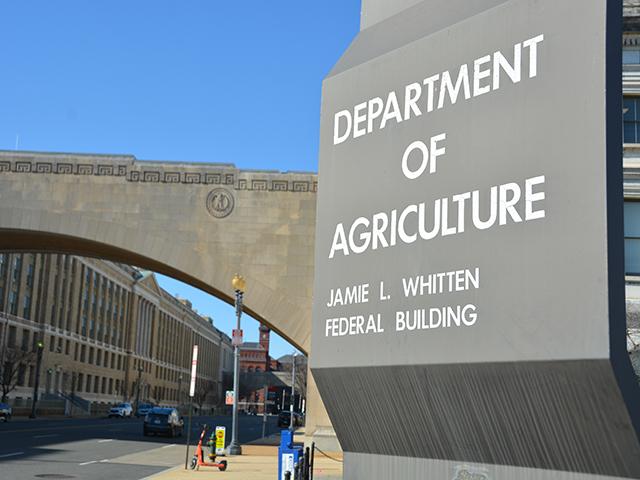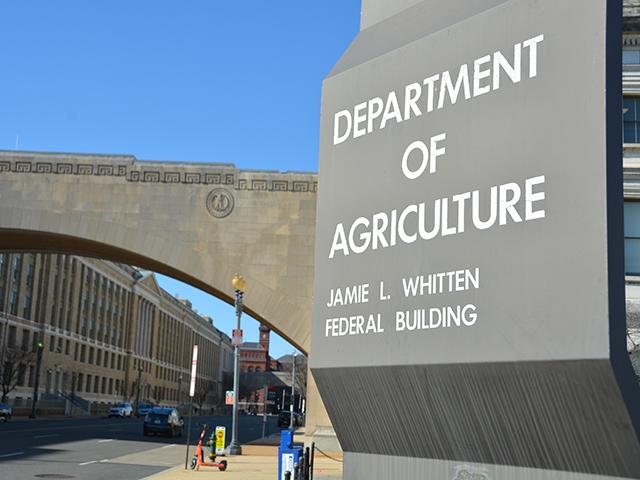Ag Policy Blog
USDA Accepting Feedback on Reorganization Plan
WASHINGTON (DTN) -- Agriculture Secretary Brooke Rollins announced Friday that USDA will accept comments on the Trump administration's plan to reorganize the Agriculture Department for a 30-day period ending Tuesday, Aug. 26.
USDA is not using the formal system of submitting comments through the Federal Register. That also means public comments about the reorganization will not be readily available for other people to immediately review.
Instead, stakeholders, including USDA employees, members of Congress, and agricultural and nutrition partners, are encouraged to provide feedback by emailing reorganization@usda.gov
In a reorganization outlined in a secretarial memorandum released July 24, Rollins said the Trump administration intends to close the South Building across from the USDA headquarters in Washington, the Beltsville Agricultural Research Center and other facilities, and move 2,600 of the 4,600 USDA positions in the National Capital Region to five "hub" cities: Raleigh, N.C., Kansas City, Mo., Indianapolis, Ind., Fort Collins, Colo., and Salt Lake City, Utah.
"As committed, we are continuing to hear stakeholder feedback on the USDA reorganization," Rollins said in a news release.
"All stakeholders -- including Capitol Hill offices, USDA employees, and members of the agricultural community -- are encouraged to share their input during the open comment period. We value your perspective as we work to ensure that USDA is best positioned to serve America's farmers, ranchers, producers, and rural communities."
The release also noted that USDA Deputy Secretary Stephen Vaden said in his testimony before the Senate Agriculture Committee on Wednesday, "President Trump made clear his second term would include relocating the sprawling federal bureaucracy to locations outside the National Capital Region."
"The department's July 24 memorandum begins to deliver on this promise and does so in a way that right-sizes the USDA footprint, eliminates unnecessary management layers, consolidates redundant or duplicative functions, and, most importantly, allows USDA to deliver on its mission to the American people within the bounds of its available financial resources," Vaden said.
USDA said it is conducting the reorganization under its authority established in the Reorganization Plan No. 2 of 1953 (5 U.S.C. app.; 7 U.S.C. 2201 note) and The Department of Agriculture Reorganization Act of 1994 (Pub. L. 103-354).
Secretary of Agriculture -- Secretary Memorandum: SM 1078-015 -- Subject: Department of Agriculture Reorganization Plan https://www.usda.gov/…
Also see, "Deputy Ag Secretary Defends USDA Reorganization Proposal to Senate Ag Committee," https://www.dtnpf.com/…
P[L1] D[0x0] M[300x250] OOP[F] ADUNIT[] T[]
Senate Confirms USDA Undersecretary for Trade and Foreign Agricultural Affairs
The U.S. Senate on Saturday confirmed President Trump's nomination of Luke Lindberg to be Agriculture undersecretary for trade and foreign agricultural affairs.
The vote on Lindberg was 78 to 17. The Agriculture undersecretary for trade and foreign agricultural affairs promotes U.S. ag exports while the Office of the U.S. Trade Representative handles trade negotiations.
Lindberg served as chief of staff and chief strategy officer at the Export-Import Bank of the United States during Trump's first term.
Most recently, he led South Dakota Trade, a public–private partnership focused on expanding international market access for regional exporters. Lindberg holds degrees in government and politics, public policy, and business administration from the University of Maryland.
Lindberg also is the son-in-law of Senate Majority Leader John Thune, R-S.D.
Senate Agriculture Committee Chairman John Boozman, R-Ark., in a news release congratulated Lindberg and described him as "a tireless advocate for restoring American agriculture's global competitiveness and delivering results for producers across the country."
Agriculture Secretary Brooke Rollins said in a news release she was "thrilled" to have Lindberg on her team, but also took the opportunity in a news release to differentiate the Trump administration's approach to trade from the Biden administration's approach.
"President Trump is reorienting our global trade relationships to put America First," Rollins said.
"Over the last four years, our trade agenda favored foreign competitors over America's farmers, ranchers, and producers. This led to a $50 billion agricultural trade deficit, when under President Trump we had a surplus."
Tom Vilsack, the Agriculture secretary in the Biden administration, told The Hagstrom Report in an email that there were trade deficits during the first Trump administration and that during the Biden years U.S. ag exports hit record highs. Vilsack also noted that the ag trade deficit has hit a record high during the last six months.
On Friday, the National Corn Growers Association and 25 state corn grower groups sent Trump administration officials a letter expressing concerns about the impact of tariffs on farm input costs.
"As grassroots organizations representing 300,000 corn growers in the United States, we write to you sharing concern with the price and availability of inputs, specifically fertilizers," the letter said.
"We raise the importance of this issue as it is quickly becoming a dire financial situation on family farms across the United States. U.S. corn growers are facing elevated prices on fertilizers and other inputs that are unfortunately approaching disastrous levels.
"Farmers source inputs from a variety of different supply chains, both domestic and imported. However, when imports are subjected to antidumping and/or countervailing duties, the resulting duty contributes to higher prices that [are] ultimately paid by farmers...
"We stand ready to supply your agencies with any information needed to alleviate the burden of input costs on farmers and sincerely appreciate your attention to our concerns," the letter said.
Also see, "President Trump Continues to Pressure Trading Partners, But Ag Exports Are Slipping," https://www.dtnpf.com/…
DTN Ag Policy Editor Chris Clayton contributed to this report.
Jerry Hagstrom can be reached at jhagstrom@nationaljournal.com
Follow him on social platform X @hagstromreport
(c) Copyright 2025 DTN, LLC. All rights reserved.






Comments
To comment, please Log In or Join our Community .